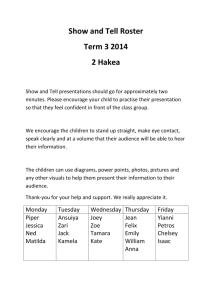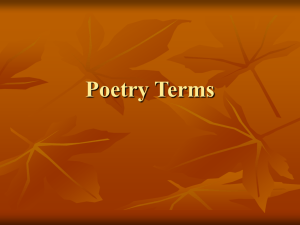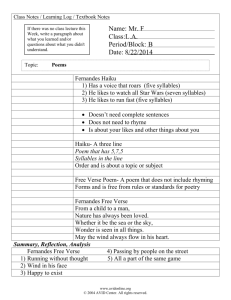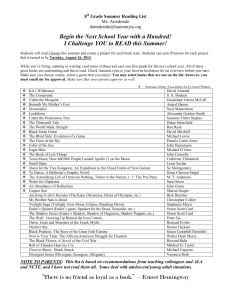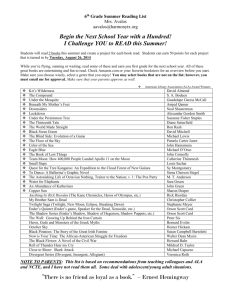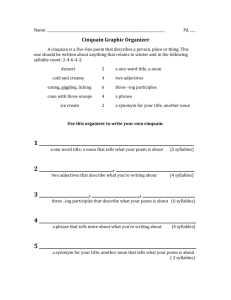File
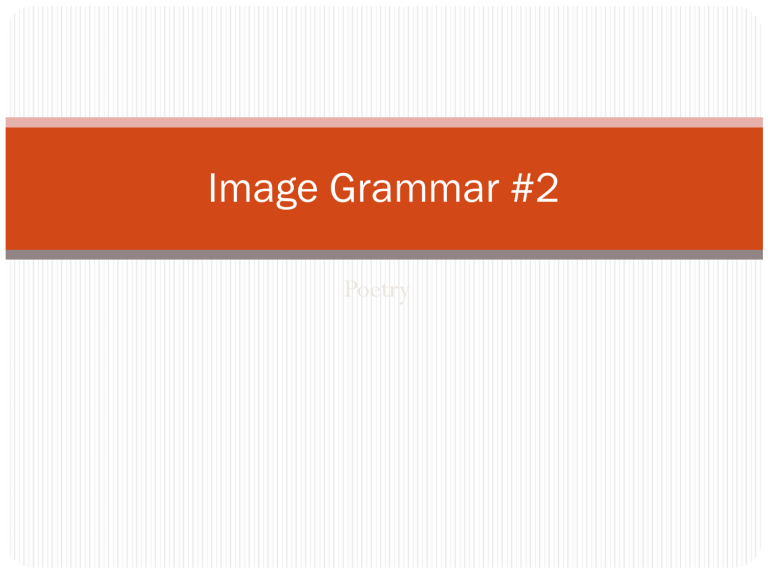
Image Grammar #2
Poetry
Haiku
Haiku - A Japanese poem composed of three unrhymed lines of five, seven, and five syllables. Haikus often reflect on some aspect of nature.
a clear sheet of sky calligraphy of blackbirds written and erased
Haikus confuse me
Too often they make no sense
Hand me the pliers
Write two of your own haikus.
Poems…So Far
Free Verse Poem (#1)
*At least 12 lines
*Did not have to rhyme
*Could be about anything (within reason)
Poems…So Far
2 Acrostic Poems (first & middle or last name; LOVE etc.)
Joyful
Ornery at times
Not shy
Speaks his mind
Mealtimes are his favorite
Inspiring when he wants to be
Life improver
Only if you find the right person
Vastly overrated
Except when it is returned
Tells the truth without fail
Hates all forms of prejudice
Poems…So Far
2 Limericks
A five line poem
Lines 1, 2, and 5 rhyme and have 8 syllables
Lines 3 and 4 rhyme and have 6 syllables
Poems…So Far
1 Sonnet
A 14 line poem
Each line has 10 syllables
Every other line rhymes
The last 2 lines rhyme
Poems…So Far
2 Haiku
A 3 line poem
The first line has 5 syllables, the second line has 7 syllables, and the third line has 5 syllables.
Cinquain
A Cinquain is a 5 line poem of 22 syllables. Each line can only have a predetermined number of syllables:
Line 1: 2 syllables
Line 2: 4 syllables
Line 3: 6 syllables
Line 4: 8 syllables
Line 5: 2 syllables
Go to website in favorites
Assignment: Write 1 Cinquain
Concrete Poem
A poem in which the lines are arranged to suggest the shape of what is being described.
*Go to website in favorites.
Write one Concrete Poem
Free Verse Poetry
Free verse poetry is free from the normal rules of poetry.
The poet may choose to include some rhyming words, but the poem does not have to rhyme.
The poem may be just a sentence that is artistically laid out on the page or it can be pages of words.
*e. e. cummings example under favorites
Some forms of free verse separate, or split, phrases and words between lines.
Punctuation may be absent or it may be used to place greater emphasis on specific words.
The main object of free verse is to use colorful words, punctuation, and word placement to convey meaning to the reader.
Free Verse
The first step in writing a free verse poem is to choose a topic.
Free verse, like other forms of poetry, can make a seemingly common or ordinary person, place, thing, or experience into something special or extraordinary.
Use your experiences and feelings to brainstorm free verse topics.
Poetry Terms
Alliteration -The repetition of the same or similar consonant sounds at the beginning of words. *Some famous examples of alliteration are tongue twisters such as Betty Botta bought some butter and Peter Piper picked a peck
of pickled peppers.
Assonance -The repetition of the same or similar vowel sounds. *An example can be found in the tongue twister
Moses supposes his toeses are roses.
Poetry Terms
Hyperbole - A figure of speech in which deliberate exaggeration is used for emphasis. *Many everyday expressions are examples of hyperbole: tons of money,
waiting for ages, a flood of tears, etc.
Personification - A figure of speech in which nonhuman things or abstract ideas are given human attributes.
*Examples include the sky is crying, dead leaves danced in
the wind, blind justice.
Poetry Terms
Simile-Comparing two unlike things using like or as.
Metaphor-Comparing two unlike things using is or was.
Activity
Write your own free verse poem of at least 15 lines.
Your poem should include at least one of the following: a Simile , a Metaphor ,
Alliteration , Assonance , Hyperbole , or
Personification
* Write this down and put your poem on the same page *ex amples
Examples
The Snake by Michele Leighty
Eyes darting, lips parting, the snake flicked its tongue.
Body slithering, scales quivering, its rattle beat like a drum.
Cold blood boiling, body coiling, the snake attacked its prey.
Feet scurrying, paws hurrying, the mouse could not get away.
If I were given one last wish,
It would be for you grandpa.
I’d wish that you were still there.
For one last Mickey Mouse pancake,
One last push on the swing,
One last read aloud of “The Night Before Christmas.”
If my wish came true, I could have
You cheering me on at my soccer games,
Applauding loudly at my ballet recitals,
Holding my hand tight when we walk to church,
And showing me how to hammer without hitting my thumb.
But most importantly I’d want,
If my wish came true,
A final hug,
A warm embrace,
A kiss on the cheek,
And one last smile to see on your face.
Activity
I want you to take this poem and revise it by adding specific details to make it stronger.
I felt so bad when my friend moved away,
We were so close and shared so many things,
I could always count on her,
She helped me with some major life problems,
And I was really sad when she left.
Writing an Ode
Pick a noun (person, place, thing, or idea).
Think about this noun.
Ask yourself the question. “What makes this thing wonderful?”
Write down all the words that describe its greatness.
Pick a rhyme scheme - this can be anything you want, but it has to rhyme in some way.
Examples:
a,a,b,b,c,c a,b,a,b,a,b a,b,c,a,b,c a,b,c,d,a,b,c,d
Activity
Using your noun and your list, write a fifteen to twenty line ode.
Your poem’s lines should average at least six syllables.
Remember to use a rhyme scheme.
You must also include:
A simile or metaphor
Alliteration, assonance, or consonance
Hyperbole or personification
An appositive
Adjectives out of order
From my window I could see how beautiful you were to me.
Standing tall so grand and green, you were magnificent and serene.
Your canopy embracing sky, a refuge to all birds that fly.
Though some found comfort in your demise, you were such a pleasure to my eyes.
Killed because you dropped your leaves?
Is that such a sin for big old trees?
Now there is nothing left to greet the sun, your branches gone your trunk undone.
No more birds will sing their songs from where you once stood big and strong.
Such foolish vanity for man to think he can kill a tree.
The sun now bakes the dry parched earth no shade left to quench my thirst.
May God free my soul to search the skies dream of trees that never die.
All I know is what I see you were beautiful to me.
Poems
Two Acrostics (Your name & an emotion)
One Limerick (5 Lines: 8 Syllables, 8, 6, 6, and 8; lines 1, 2, and 5 rhyme; lines 3 & 4 rhyme)
One Sonnet (14 lines: every other line rhymes and the final two lines rhyme)
Two Haikus (3 lines: 5 syllables, 7, and 5)
One Cinquain (5 Lines: 2 syllables, 4, 6, 8, and 2)
One Concrete Poem (shape)
Two Free Verse Poems (12 lines; 15 lines)
